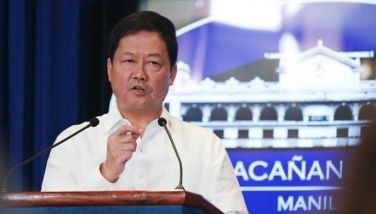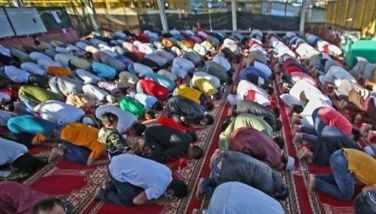PNP official calls for unity within ranks
July 28, 2004 | 12:00am
Amid the early jockeying for the top post at the Philippine National Police, one of the main contenders appealed yesterday for unity as he reminded his rivals that incumbent PNP chief Director General Hermogenes Ebdane Jr. has not even "retired" yet.
Deputy Director General Reynaldo Velasco, chief of the Philippine Center for Transnational Crime (PCTC), said the 114,000-strong police organization needs more unity at this time to ensure that its peace and order programs are continuously implemented.
"General Ebdane is not retiring yet. Why force him to retire early to accommodate us?" Velasco asked. Ebdane’s mandatory retirement will be on Dec. 30, when he turns 56.
Velasco broke his silence of several weeks following reports that the issue of maneuverings for the top police post has "divided" the PNP. A number of reshuffles were also put on hold as the wait continues whether Ebdane will be forced to retire before yearend.
Velasco is a member of the Philippine Military Academy (PMA) Class ’71, which also has two other contenders for the PNP leadership.
Velasco said he does not want to quarrel with his classmates — Deputy Director Generals Edgar Aglipay and Virtus Gil — to avoid putting "extra pressure" on President Arroyo.
The President has the "last say" on the appointment of the next PNP director, Velasco pointed out.
"She (Mrs. Arroyo) has her own criteria and she knows what is best for the organization. We should not even be talking about this because General Ebdane has not even retired yet," he told reporters.
Velasco, however, lamented that he was not included by his "classmates" during a dialogue last week initiated by Aglipay to finally settle the "infighting" caused by the jockeying for the PNP leadership.
While the camps of Ebdane and Aglipay argued over the length of stay in service of the next police chief, Velasco invoked seniority as among the criteria for consideration.
"Why are they discounting me ? They should not assume because seniority is (a) consideration," he said.
If he is not appointed as the next PNP chief, Velasco said he should be considered for the two next highest positions.
The law dictates, Velasco noted, that "seniority is a main consideration" for the top posts of deputy director for administration and deputy director for operations.
After Ebdane, Velasco is the most senior among the top PNP officials, followed by Aglipay and Gil. Velasco has 10 more months remaining in the service, making him qualified as candidate for the top PNP office.
But he has to be wary of the so-called "six-month rule." Based on Republic Act 6075, a police officer may not be appointed to any post or promoted if he has less than six months left in the service.
If this law will be applied, Aglipay and Director Enrique Galang, PNP directorial staff chief, will be directly affected. Aglipay is retiring on Sept. 13 and Galang on Dec. 24.
Deputy Director General Reynaldo Velasco, chief of the Philippine Center for Transnational Crime (PCTC), said the 114,000-strong police organization needs more unity at this time to ensure that its peace and order programs are continuously implemented.
"General Ebdane is not retiring yet. Why force him to retire early to accommodate us?" Velasco asked. Ebdane’s mandatory retirement will be on Dec. 30, when he turns 56.
Velasco broke his silence of several weeks following reports that the issue of maneuverings for the top police post has "divided" the PNP. A number of reshuffles were also put on hold as the wait continues whether Ebdane will be forced to retire before yearend.
Velasco is a member of the Philippine Military Academy (PMA) Class ’71, which also has two other contenders for the PNP leadership.
Velasco said he does not want to quarrel with his classmates — Deputy Director Generals Edgar Aglipay and Virtus Gil — to avoid putting "extra pressure" on President Arroyo.
The President has the "last say" on the appointment of the next PNP director, Velasco pointed out.
"She (Mrs. Arroyo) has her own criteria and she knows what is best for the organization. We should not even be talking about this because General Ebdane has not even retired yet," he told reporters.
Velasco, however, lamented that he was not included by his "classmates" during a dialogue last week initiated by Aglipay to finally settle the "infighting" caused by the jockeying for the PNP leadership.
While the camps of Ebdane and Aglipay argued over the length of stay in service of the next police chief, Velasco invoked seniority as among the criteria for consideration.
"Why are they discounting me ? They should not assume because seniority is (a) consideration," he said.
If he is not appointed as the next PNP chief, Velasco said he should be considered for the two next highest positions.
The law dictates, Velasco noted, that "seniority is a main consideration" for the top posts of deputy director for administration and deputy director for operations.
After Ebdane, Velasco is the most senior among the top PNP officials, followed by Aglipay and Gil. Velasco has 10 more months remaining in the service, making him qualified as candidate for the top PNP office.
But he has to be wary of the so-called "six-month rule." Based on Republic Act 6075, a police officer may not be appointed to any post or promoted if he has less than six months left in the service.
If this law will be applied, Aglipay and Director Enrique Galang, PNP directorial staff chief, will be directly affected. Aglipay is retiring on Sept. 13 and Galang on Dec. 24.
BrandSpace Articles
<
>
- Latest
- Trending
Trending
Latest
Trending
Latest
Recommended

































